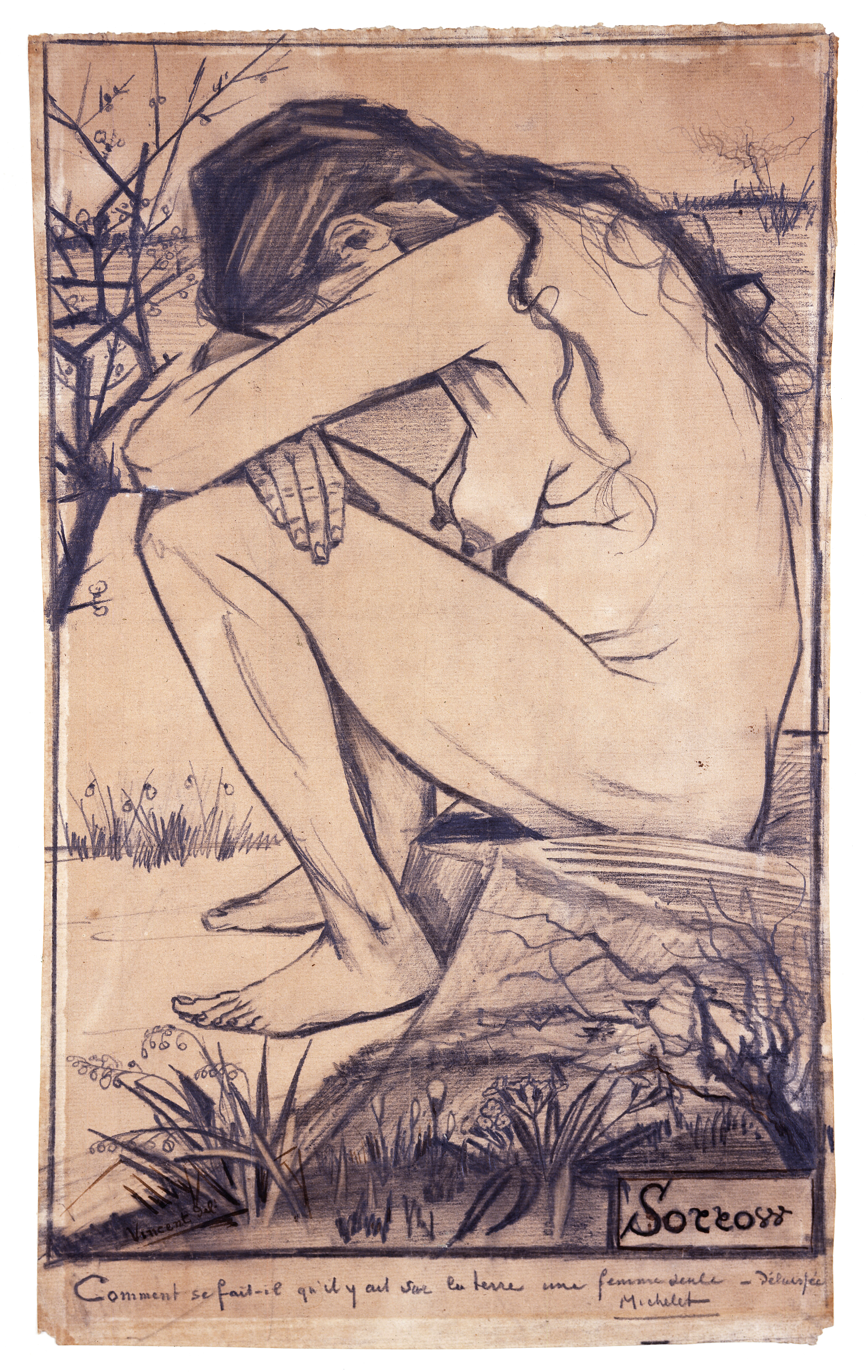Sorrow (emotion) on:
[Wikipedia]
[Google]
[Amazon]
 Sorrow is an
Sorrow is an
 Sorrow is an
Sorrow is an emotion
Emotions are mental states brought on by neurophysiological changes, variously associated with thoughts, feelings, behavioral responses, and a degree of pleasure or displeasure. There is currently no scientific consensus on a definition. ...
, feeling, or sentiment. Sorrow "is more 'intense' than sadness
Sadness is an emotional pain associated with, or characterized by, feelings of disadvantage, loss, despair, grief, helplessness, disappointment and sorrow. An individual experiencing sadness may become quiet or lethargic, and withdraw them ...
... it implies a long-term state". At the same time "sorrow — but not unhappiness — suggests a degree of resignation... which lends sorrow its peculiar air of dignity".Wierzbicka, p. 66
Moreover, "in terms of attitude, sorrow can be said to be half way between ''sadness
Sadness is an emotional pain associated with, or characterized by, feelings of disadvantage, loss, despair, grief, helplessness, disappointment and sorrow. An individual experiencing sadness may become quiet or lethargic, and withdraw them ...
'' (accepting) and '' distress'' (not accepting)".
Cult
Romanticism
Romanticism (also known as the Romantic movement or Romantic era) was an artistic, literary, musical, and intellectual movement that originated in Europe towards the end of the 18th century, and in most areas was at its peak in the approximate ...
saw a cult of sorrow develop, reaching back to '' The Sorrows of Young Werther'' of 1774, and extending through the nineteenth century with contributions like Tennyson's " In Memoriam" — "O Sorrow, wilt thou live with me/No casual mistress, but a wife" — up to W. B. Yeats in 1889, still "of his high comrade Sorrow dreaming". While it may be that "the Romantic hero's cult of sorrow is largely a matter of pretence", as Jane Austen pointed out satirically through Marianne Dashwood, "brooding over her sorrows... this excess of suffering" may nevertheless have serious consequences.
Partly in reaction, the 20th century has by contrast been pervaded by the belief that "''acting'' sorrowful can actually make me sorrowful, as William James long ago observed". Certainly "in the modern Anglo-emotional culture, characterized by the 'dampening of the emotions' in general... sorrow has largely given way to the milder, less painful, and more transient sadness". A latter-day Werther is likely to be greeted by the call to '"Come off it, Gordon. We all know there is no sorrow like unto your sorrow"'; while any conventional 'valeoftearishness and deathwhereisthystingishness' would be met by the participants 'looking behind the sombre backs of one another's cards and discovering their colored faces'. Perhaps only the occasional subculture like the Jung
Carl Gustav Jung ( ; ; 26 July 1875 – 6 June 1961) was a Swiss psychiatrist and psychoanalyst who founded analytical psychology. Jung's work has been influential in the fields of psychiatry, anthropology, archaeology, literature, phil ...
ian would still seek to 'call up from the busy adult man the sorrow of animal life, the grief of all nature, "the tears of things"'.
Late modernity
Late modernity (or liquid modernity) is the characterization of today's highly developed global societies as the continuation (or development) of modernity rather than as an element of the succeeding era known as postmodernity, or the postmod ...
has (if anything) only intensified the shift: 'the postmodern is closer to the human comedy than to the abyssal discontent...the abyss of sorrow'.
Postponement
'Not feeling sorrow invites fear into our lives. The longer we put off feeling sorrow, the greater our fear of it becomes. Postponing the expression of the feeling causes its energy to grow'. At the same time, it would seem that 'grief in general is a "taming" of the primitive violent discharge affect, characterized by fear and self-destruction, to be seen in mourning'. Julia Kristeva suggests that 'taming sorrow, not fleeing sadness at once but allowing it to settle for a while...is what one of the temporary and yet indispensable phases ofanalysis
Analysis ( : analyses) is the process of breaking a complex topic or substance into smaller parts in order to gain a better understanding of it. The technique has been applied in the study of mathematics and logic since before Aristotle (3 ...
might be'.
Shand and McDougall
Sadness is one of four interconnected ''sentiments'' in the system of Alexander Faulkner Shand, the others being fear, anger, and joy. In this system, when an impulsive tendency towards some important object is frustrated, the resultant sentiment is sorrow. In Shand's view, the emotion of sorrow, which he classifies as a primary emotion, has two ''impulses'': to cling to the object of sorrow, and to repair the injuries done to that object that caused the emotion in the first place. Thus the primary emotion of sorrow is the basis for the emotion of pity, which Shand describes as a fusion of sorrow and joy: sorrow at the injury done to the object of pity, and joy as an "element of sweetness" tinging that sorrow. William McDougall disagreed with Shand's view, observing that Shand himself recognized that sorrow was itself derived from simpler elements. To support this argument, he observes that grief, at a loss, is a form of sorrow where there is no impulse to repair injury, and that therefore there are identifiable subcomponents of sorrow. He also observes that although there is an element of emotional pain in sorrow, there is no such element in pity, thus pity is not a compound made from sorrow as a simpler component.See also
References
Further reading
* {{emotion-footer Emotions